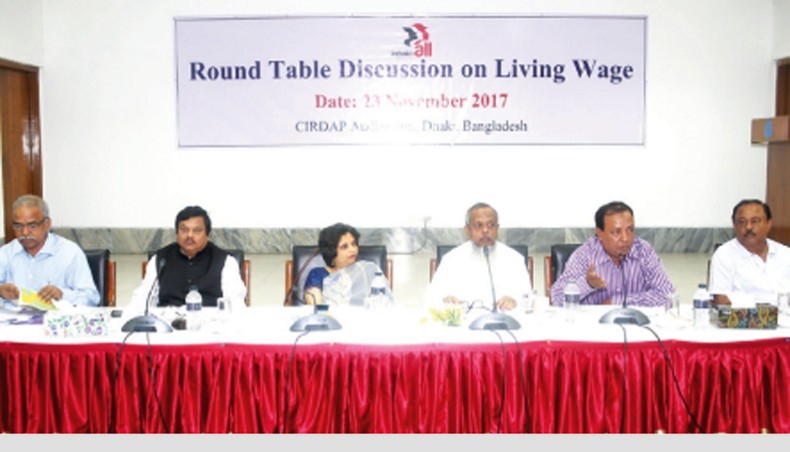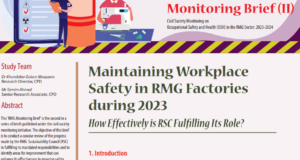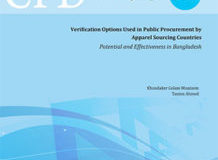Published in New Age on November 24, 2017

Photo: New Age
A survey conducted by IndustriAll Bangladesh Council found that 64 per cent of readymade garment workers cannot bear all the expenses of their daily essentials. The workers need Tk 19,217 as monthly minimum pay to meet their family expenditure but the minimum wage in the sector is Tk 5,300. The survey results revealed on Thursday at a round table on living wages for RMG workers organised by IBC was held at CIRDAP Auditorium in the city.
The survey said that 99.60 per cent workers have no savings and 100 per cent of them are indebted by any means. The IBC conducted survey on 850 workers in Dhaka, Gazipur, Ashulia, Narayangonj and Chittagong and it was found that 77.2 per cent of workers do overtime in the factories to meet their family expenditures.
The IBC survey showed that as per the government pay scale a cleaner receives Tk 15,250 as minimum monthly gross pay while a garment worker received only Tk 5,300. The survey also showed that RMG workers in India, Pakistan, Cambodia and Myanmar received minimum wages at $168, $124, $170 and $85 while Bangladeshi workers receive the lowest at $67.
Bangladesh Textile Garment Workers League president ZM Kamrul Anam presented the survey results in the event. Rights activists and labour leaders called upon the government, factory owners and global buyers to share the responsibility to ensure living wages for the readymade garment workers so that they can live a decent life. They urged all the trade unions for collective movement to achieve living wages for the workers in next wage board.
Sultan Uddin Ahmed, executive director of Bangladesh Institute of Labour Studies, said that forming wage board for the RMG workers could not ensure fair wages rather a national standard for determining wages can ensure fair wages for the workers. He said that it was noy fair that the young girls and boys who worked in garment factories would be used only for making profit for the factory owners and global buyers. Sultan urged the buyers to share their responsibility to ensure Bangladeshi garment workers’ decent life. He suggested setting the minimum wages for the RMG workers considering living cost, wages of other sectors and minimum wages for the lowest grade (20th grade) employees of the government.
Apurba Kaya, secretary of South Asian office of IndustriAll Global Union, said that comparison with other countries or sectors is not important, RMG workers wages should be increased in Bangladesh. She urged government and factory owners to ensure fair wages for the workers who are contributing huge to retain the economic growth of Bangladesh.
Nazma Akter, president of Bangladesh Combined Garment Workers’ Federation, said that wages for the RMG workers have to be set considering the market prices so that they can lead a decent life with their family members. ‘Factory owners alone are not responsible for workers’ decent life, but the government and buyers also have to share their responsibility,’ she said.
Nurul Islam, general secretary of United Federation of Garment workers, urged the trade union leaders to remain vigilant so that factory owners cannot deprive workers in the coming wage board.
He said that there was no alternative to taking to the street as garment factory owners would not agree fair wages for the workers.
Md Towhidur Rahman, secretary general of IBC, said that they would wait to observe the initiative from the government and factory owners to review the wages of the workers. If the owners and the government failed to take satisfactory move to review wages, workers federations would announce movement on the New Year 2018, he said.
 CPD RMG Study Stitching a better future for Bangladesh
CPD RMG Study Stitching a better future for Bangladesh



